The coastline of this predominantly mountainous island with its countless chapels, its olive trees, its vineyards and its limpid air, is adorned with small, attractive coves. Those features combine with the crystal-clear sea, the superb sandy beaches and the good range of amenities to make Ios a magnet for tourists.
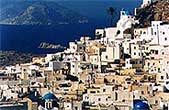 Locally called Nios, this is an island whose history goes back to
prehistoric times. According to legend, the "poet of poets", the
"god-like" Homer was buried at Plakotos, in the north of the island.
Pausanias tells us that there was an inscription at Delphi
confirming the poet's interment on Ios, which was the, homeland of
his mother. Above the pretty harbour of Ormos, where fishing-boats
and yachts bob at anchor, stands the capital of Ios or Hora. The
town stands on the site of the ancient city of the same name and is
a typical Cycladic settlement,
Locally called Nios, this is an island whose history goes back to
prehistoric times. According to legend, the "poet of poets", the
"god-like" Homer was buried at Plakotos, in the north of the island.
Pausanias tells us that there was an inscription at Delphi
confirming the poet's interment on Ios, which was the, homeland of
his mother. Above the pretty harbour of Ormos, where fishing-boats
and yachts bob at anchor, stands the capital of Ios or Hora. The
town stands on the site of the ancient city of the same name and is
a typical Cycladic settlement,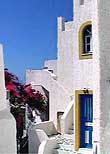 with white- washed houses, narrow alleys and chapels. The whole
beautiful image is rounded off with the bulk of the medieval castle
and the row of windmills, which top the town.
with white- washed houses, narrow alleys and chapels. The whole
beautiful image is rounded off with the bulk of the medieval castle
and the row of windmills, which top the town.
This might sound like the perfect setting for a peaceful relaxing holiday. first impressions can be deceiving because during June, July and August, once the sun goes down, this quiet port and the typical Cycladic looking village that overlooks it from the hill above, literally rocks all night long. Those innocent little white geometric houses open their doors to become discos, bars, rock clubs, boutiques, snack bars, cafes, restaurants and anything you need to cause or cure a hangover.
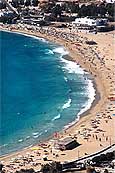 Days are spent on the beach with Mylopotas being one of the longest and
finest in Greece, packed with young people of every shape and color,
from every country on the planet and perhaps some planets beyond.
It's a time for swimming and meeting people in the cafes and
restaurants that share the beach and for some it's the time to get
an early start for the evenings festivities if not a little hair of
the dog. There is a wide range of water sports including scuba
diving, windsurfing and some of the more noisy variety like jet skis
or being dragged behind a speedboat on a giant floating banana.
Days are spent on the beach with Mylopotas being one of the longest and
finest in Greece, packed with young people of every shape and color,
from every country on the planet and perhaps some planets beyond.
It's a time for swimming and meeting people in the cafes and
restaurants that share the beach and for some it's the time to get
an early start for the evenings festivities if not a little hair of
the dog. There is a wide range of water sports including scuba
diving, windsurfing and some of the more noisy variety like jet skis
or being dragged behind a speedboat on a giant floating banana.
When the sun begins to go down and the air begins to cool people make their way up the road to town, passing clubs and bars on the way. It may take a couple days to find the bar that suits you the best or you may find they all suit you. You may find that none of them suit you but you don't really care because you are happy to be there.
For those people looking for a rest from the party scene or visiting in the spring or fall, Ios has a lot to more to offer:
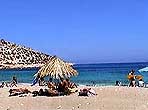 TOMB OF HOMER, PLAKOTO, AGHIA THEODOTI
TOMB OF HOMER, PLAKOTO, AGHIA THEODOTI
Setting off from the port or from Chora, by motorbike or by car, you
make your way up to Pano Kambos, a fertile valley rich with
vineyards and olive trees, and to Koulida. From there, if you leave
the asphalt road and take the path branching off to the left, you'll
be heading to the amazing beach of Plakoto. Some meters short of
that, there's another path that leads to the ancient ruins dating
from the Hellenistic period, where tradition claims that the tomb of
the poet Homer lies. On your way back, you can also drive to Aghia
Theodoti bay. Limpid waters and a sandy beach with taverns, as well
as the occasion to admire the 16th century church of St. Theodoti,
the oldest on the island, built in the 16th century.
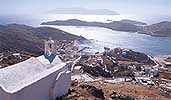 PIRGOS, PALEOKASTRO, PSATHI
PIRGOS, PALEOKASTRO, PSATHI
Before the road starts descending to Aghia Theodoti, you
can turn right at the first crossroads and take the road leading to
Pirgos. There, on the highest peak of the island (713 m.), stands
the 16th century Byzantine church of Aghios Ioannis (St. John),
built on the ruins of an ancient temple dedicated to Apollo.
Taking the same road back, you will
soon reach the beautiful winding, stonepaved road to Paleokastro.
Its steps lead to the windswept site where the Byzantine castle
lies, overlooking the Aegean with panoramic views in all directions.
Among 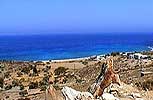 the
ruins stands the beautiful church of Panagia Paleokastritissa (Our
lady of the Old Castle). The same road also leads to Psathi, a long
beach with deep blue waters and white sand, one of the breeding
places for the Mediterranean sea-turtle.
the
ruins stands the beautiful church of Panagia Paleokastritissa (Our
lady of the Old Castle). The same road also leads to Psathi, a long
beach with deep blue waters and white sand, one of the breeding
places for the Mediterranean sea-turtle.
To your left, tucked away among the rocks, there are some smaller, exquisite, sand-bottomed beaches, and to your right the ruins of another ancient temple. A little before the beach, you can take a detour to Psathi, a small village well-situated on the most fertile spot of the island, with a few taverns.
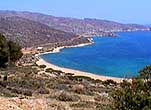 KLIMA, KALAMOS, TRIS KLISSIES, MANGANARI
KLIMA, KALAMOS, TRIS KLISSIES, MANGANARI
After driving from Chora to Mylopotas, follow the dirt
road at the end of the beach, leading to the south coast of the
island. This itinerary will maybe offer you the most interesting
excursion. By passing Mylopotas and turning right at the crossroads,
you reach the splendidly isolated beach of Klima.
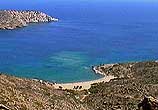
If you enter the main road again, it will take you to the monastery of Kalamos, a very well-preserved 200-year-old building, a special place of worship for the locals. The same road leads straight to Kalamos, a beautiful pebbly beach, or, if you turn left after the monastery, the way to Tris Klissies reveals three beautiful secluded beaches, accessible only on foot.
A short way off lies Manganari. Four of the most beautiful beaches in the Aegean, each one lying next to the other, wait for the visitor to enjoy their peaceful nature. There are many seaside taverns where you can taste great fresh fish.
We believe that Ios is one of the best places in Europe for people who are looking for unlimited fun, 24 hours a day! There is something for everybody on this tiny island - beaches, sports, excursions, restaurants, bars, culture, and one of the reasons Ios is so special is its very unique party style! If you are of college age and you had fun on spring break, or you didn't... go to Ios. Guaranteed to blow you away. You may never be the same.
